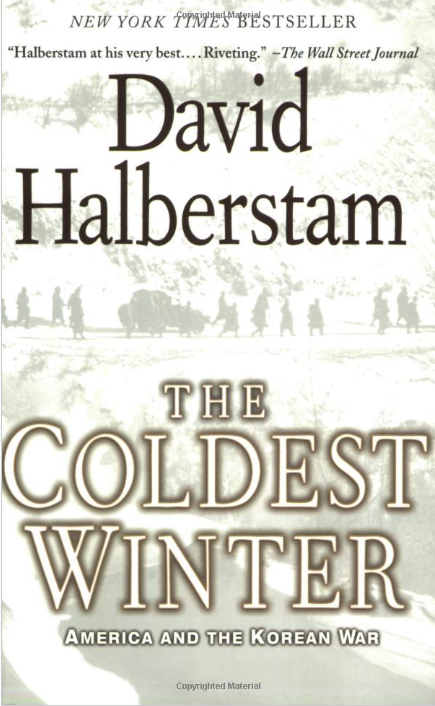Book Review by George Kennedy

The author died in a tragic auto accident before his latest work was published. I do wonder if his untimely death had an impact on the book’s popularity.
I have always been a student of America’s wars in the 20th Century, especially World War II.
The Korean War fascinated me because it started on my birthday, June 25th and I do recall some of the early images of the conflict in the press. Years later, as a Foreign Service officer, I was assigned to Pusan South Korea; an assignment of special significance for me.
Many of the older brothers of classmates, a dear family friend, and a life-long mentor, all were combatants in that conflict.
Each of those I knew that fought in Korea was profoundly shaped by their experience there. This was a book I had to read.
The Coldest Winter: America and the Korean War and other books by David Halberstam occupy space in my library, but this one, “The Coldest Winter,” was riveting.
I poured through it with the kind of intensity a good book has for me.
The author describes early contacts between an ill-prepared U.S. Army – garrison troops in Japan – and elements of the North Korean Army and seasoned Chinese Communist forces.
The detail was fascinating, but what captured my attention was the political context for the war: How the loss of China in 1949 conditioned the political reflexes of an administration led by President Harry Truman (the unlikely president) under siege from the Republican Party for having “lost” China to Mao just a year earlier.
Here you had a president who feared the loss of his presidency and being labeled “soft on Communism” by the very aggressive China Lobby, the influential media baron Henry Luce, and an energized Republican opposition that had finally found a galvanizing political issue.
The fourth leg of the opposition, perhaps the most feared of all, was Five-Star General of the Army, Douglas MacArthur, our “Pro-Consul” in Japan; a heroic figure of epic dimension, with an out-sized ego, and buttressed by a legion of fanatic supporters in this country.
MacArthur confidently told the President and the Joint Chiefs that China would not enter the war, that they of little faith should trust him. The Chinese did enter the war and Halberstam carries us on a 600-page journey of America’s effort to prosecute the wrong war in the wrong place at the wrong time culminating in the firing of the country’s longest serving general – over 30 years as a general officer.
For this reader, the book took on special significance because of a lengthy career in foreign affairs, service in Korea, and an enduring interest in foreign policy – especially policies that lead to war. Halberstam describes the poisonous political atmosphere between the Democrats and Republicans that precipitated American involvement in its second major conflict within five years after the ending of WWII.
In many respects, the ideological rifts of the 1950s mirror those of today when, once again, America is mired in another conflict that just may end without a U.S. victory, and the overarching theme is, again, America’s role in the world.
For the students of history and foreign policy, this is a good read!
David Halberstam was one of America’s most distinguished journalists and historians. The author of fifteen bestsellers, including The Best and the Brightest, he won the Pulitzer Prize for his Vietnam reporting at the age of thirty. He was killed in a car accident on April 23, 2007, while on his way to an interview for what was to be his next book.

